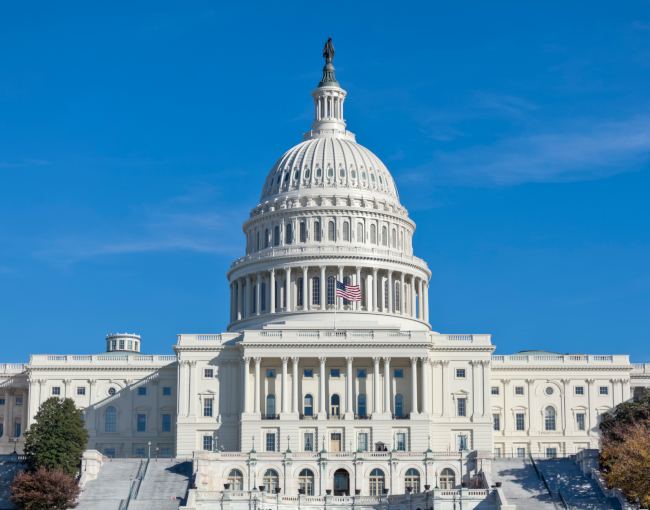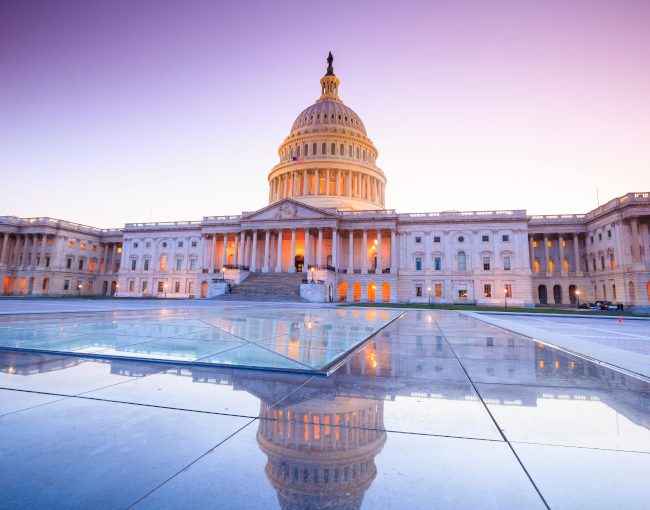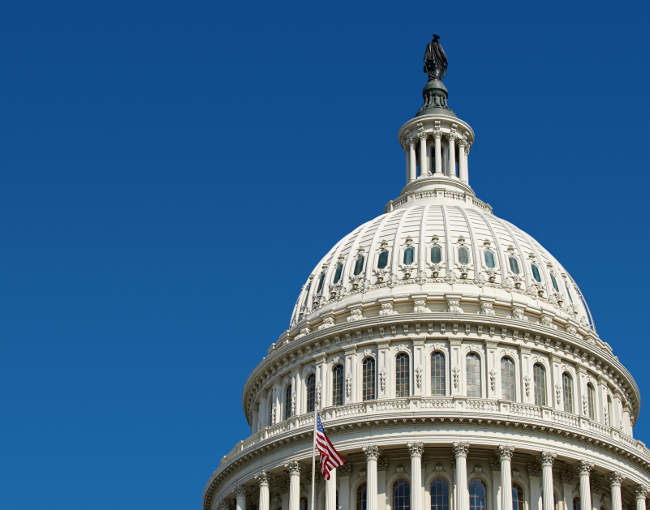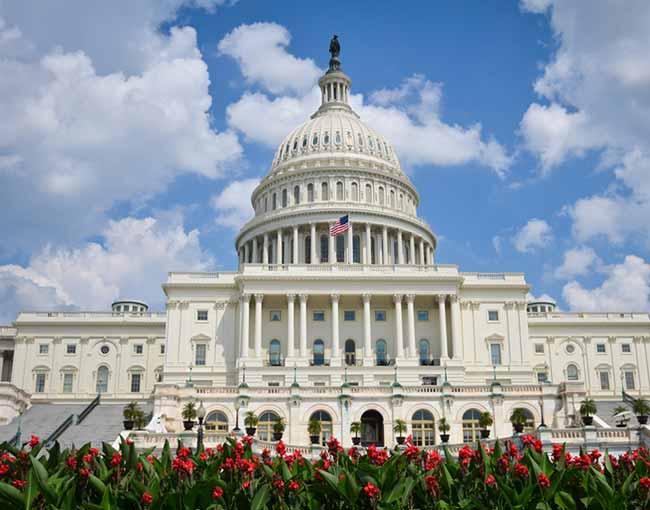
Each party’s chief spokesperson and coordinator of legislative strategies and priorities in the Senate. READ MORE
(By accessing, browsing or using the pages below, you agree to the Blog Conditions of Use/Disclaimer available under "Links.")

Each party’s chief spokesperson and coordinator of legislative strategies and priorities in the Senate. READ MORE

An administrative process used by the Executive Branch and its federal agencies during which a proposed rule is debated and developed by relevant interest groups and agency representatives. READ MORE

A voluntary membership organization in Congress centering around a particular issue or cause. READ MORE

The order in which government leaders are tasked with performing the duties of the president if the incumbent cannot carry out the office’s responsibilities. READ MORE

A procedural rule that allows leadership of both the majority and minority parties in the House of Representatives to have unlimited speaking time at the end of debate. READ MORE

A special parliamentary period when the Senate provides its prerogative on treaties, nominations, and other business. READ MORE

An officer of the House of Representatives responsible for recordkeeping, correspondence, tracking floor proceedings, and managing the offices and staff of deceased or retiring members. READ MORE

The appropriations suballocation (or budget cap) issued to each of the 12 congressional appropriations subcommittees, usually following the passage of a concurrent budget resolution. READ MORE

A point of order is a parliamentary rule designed to ensure members of Congress follow the rules of their chamber and behave with decorum during House or Senate proceedings. It was introduced to the legislative process in a rules manual authored by Thomas Jefferson during his time as vice president, which was later adopted as the official rulebook for the House in 1837. READ MORE

Statements of Administration Policy (SAPs) are produced by the Office of Management and Budget (OMB), which is part of the Executive Office of the President at the White House. SAPs provide either an endorsement of or objection to particular legislation and, if in the latter category, can be accompanied by a veto threat. Not every bill garners a SAP. READ MORE

Federal government spending can be broken down into two broad categories: mandatory and discretionary. Mandatory spending does not require an annual vote by Congress and is dictated by prior law. Discretionary spending, however, is subject to the annual appropriations process and includes funding for essential federal programs like national defense, social services, highways, and foreign aid, to name just a few. READ MORE

A motion to vacate is a congressional procedure by which members of the House of Representatives can submit a request for the presiding officer to step down. READ MORE

Legislation can follow a standard trajectory to becoming a law: the bill is introduced by a member of Congress, assigned to a committee for debate and amendment, and if it is approved by that committee and supported by the leadership of the majority party, it is placed on the House or Senate calendar to be debated, amended, and voted upon by the full chamber. READ MORE

Standing committees have been a mainstay since the First Congress. They are permanent panels in both chambers that conduct investigations, consider legislation, oversee the Executive and Judicial branches, and, in the Senate, confirm Presidential nominees. But how exactly do members get seated on these panels? READ MORE

Referendums (or citizen initiatives) have a long history in American politics and even pre-date the founding of the Republic. In 1775, Thomas Jefferson proposed the inclusion a mechanism for referendums in the Virginia state constitution, which was ultimately rejected. The concept then languished until the rise of the early Populist movement in the late 19th century. READ MORE

When limited hearing time and complex issues intersect, questions for the record – also known as QFRs – can be the best opportunity for organizations to raise an issue in a constructive manner and gather further information. Well-crafted questions for the record may elicit nuanced and detailed responses, especially from federal agencies, that would otherwise be difficult to obtain during a verbal back-and-forth in a hearing. READ MORE

The Biden Administration has been reviewing options to address a nearly $2 trillion problem facing Americans: student loan debt. Since taking office, the Biden Administration has extended the pandemic-era pause on federal student loan payments, canceled billions in student loans for borrowers with total and permanent disabilities, expanded the Public Service Loan Forgiveness (PSLF) program, and is expected to issue billions in borrower defense repayments. READ MORE

Much of Congress’s legislative work is conducted at the committee level. From oversight and nominations hearings to marking up and reporting legislation to the floor for consideration, committees are one of the fundamental cogs in the wheels of our democratic process. The House and Senate form their own committees at the beginning of each Congress; some of these are permanent (e.g., the Appropriations Committees), and some are “select.” READ MORE

An offset is a maneuver that attempts to ensure revenue-neutral taxing or spending in Congress. READ MORE

At this time last year, we wrote about the return of earmarks to Congress after a decade-long ban. Earmarks are appropriated funds that are allocated to a specific entity or initiative in a member of Congress’s state or district. READ MORE

We have all watched for the past few weeks as tensions between Ukraine and Russia have mounted, culminating in an unprovoked invasion of Ukraine by the Russian Federation. As the US has debated its response, one word has threaded itself into seemingly every scenario: sanctions. This month, we take a step back and explain what sanctions are and who in government has authority over them. READ MORE

The word “omnibus” is Latin for “for all” or “everybody.” It has a similar meaning in modern American politics: today, an omnibus bill refers to a single bill that packages together multiple policy proposals. The most common omnibus bills are appropriations bills, where lawmakers assemble most or all twelve government funding bills into a massive spending package. READ MORE

The Government Accountability Office (GAO) is an independent, non-partisan agency that works for Congress and is accordingly part of the Legislative Branch. Congress created the GAO in 1921 under the Budget and Accounting Act to oversee government spending. The agency’s responsibilities grew after World War II as government programs expanded. READ MORE

The congressional calendar, like most business on Capitol Hill, is full of technicalities and shaped by Congress’s history. The congressional schedule from the Republic’s early decades looks much different than the one Congress follows today. READ MORE

In Congress, legislation has a few different paths to becoming a law. One or more members of Congress can champion an issue that moves through the legislative process in the traditional way (i.e., regular order). With large bills, negotiations often begin or conclude among the “four corners.” The four corners can refer to one of two groups: the House Speaker, House Minority Leader, Senate Majority Leader, and Senate Minority Leader; or the House and Senate chairs and ranking members of a certain committee or subcommittee. READ MORE

A colloquy is a scripted conversation on the House or Senate floor between one or more members of Congress, oftentimes including the chair or ranking member of a committee or subcommittee of jurisdiction. Colloquies are used to debate, draw attention to, or clarify the legislative intent behind a pending provision. READ MORE

Federal legislation falls into one of two categories: authorizations, which details the policies and funding levels of federal programs; and appropriations, which provides the actual funding for those activities. While appropriations legislation is referred to the House or Senate Appropriations Committee, authorization legislation can be referred to one of over 20 committees in each chamber. READ MORE

Congress’s multi-step budget process begins with a budget resolution. The resolution is a nonbinding agreement between the House and Senate on the budget framework for that year The nonpartisan nature of these bodies was complicated in 2015 when House Republicans adopted a rule that required the CBO to use a method called “dynamic scoring.” READ MORE

In this month's Wonkology, our Lobbying & Policy team discuss the congressionally set limit on the amount of money the federal government can borrow. READ MORE

In this month's Wonkology, our Lobbying & Policy team discuss the House Democratic and Republican leaders who oversee their caucus’ messaging, meetings, and organization. READ MORE

In this month's Wonkology, our Lobbying & Policy team discuss the nonpartisan official in charge of interpreting Senate rules regarding floor procedures and legislation. READ MORE

In this month's Wonkology, our Lobbying & Policy team discuss Community Project Funding and how it benefits a member of Congress's district. READ MORE

In this month's Wonkology, our Lobbying & Policy team takes a look at budget reconciliation and how the process can be used to expedite the passage of budget-related legislation. READ MORE

Under the Federal Vacancies Act, a government employee can temporarily assume an agency position without being confirmed. But the Act limits who can serve as an acting secretary and for how long they can serve in that capacity. READ MORE

In this month's Wonkology, we discuss the federal statute that governs the presidential transition process: the Presidential Transition Act. READ MORE

In this month’s Wonkology, we discuss Presidential Electors, the individuals selected to vote for president and vice president in the Electoral College. READ MORE

In this month's Wonkology, we examine the filibuster and it's use in the Senate to prevent or delay a measure from coming to a vote. READ MORE

In this month's Wonkology, we discuss a process that allows Congress to nullify a federal agency regulation by submitting a joint resolution of disapproval for the president to sign. READ MORE

In this month's Wonkology, we discuss the a legislative day, a period of time that begins when a chamber of Congress gavels into session and ends when the chamber formally adjourns. READ MORE

In this edition of Wonkology, we discuss the parliamentary tool that allows for the expedited passage of legislation by common agreement. READ MORE

A pro forma session is a brief congressional session that extends a current session to avoid a formal recess. READ MORE

The Senate has another practice that both speeds up deliberation and establishes a more fulsome legislative record: vote-a-rama. A vote-a-rama is when senators vote on 15 or more amendments back-to-back, marathon style. READ MORE

For certain types of congressional business, in-person voting is not required, and members can vote by proxy. Voting by proxy allows one member to specifically designate another member to cast a vote on their behalf. READ MORE

This month, we explore Supplemental Appropriations, Federal spending allocated outside of the regular appropriations process. READ MORE

What is the Byrd Rule? A rule that prevents extraneous provisions from being included in reconciliation bills. READ MORE

In this month's Wonkology, we discuss instances when Congress suspends the typical rules that govern legislation so bipartisan bills can forward more quickly. READ MORE

In this month's Wonkology, we discuss the first draft of legislation introduced by the chair of a committee or subcommittee to be considered at a markup. READ MORE

In this month's Wonkology, we discuss anomalies - provisions in a continuing resolution that can change the duration, amount, or purpose of appropriated funds. READ MORE

In this month's Wonkology, we discuss the differences between engrossed bills and enrolled bills. READ MORE

What is a manager's amendment? A package of amendments introduced by the chair or lead sponsor of a piece of legislation. READ MORE

What is Deem and Pass? A process in the House of Representatives that allows for the passage of legislation by voting on a rule - and not the actual bill. READ MORE

In this month's Wonkology, we discuss how Congress can use sequestration to control their budget and deficit. READ MORE

What is the Gephardt Rule? A House rule that automatically raises the debt limit without holding a separate vote. READ MORE

In this Wonkology, we take a look at PAYGO - the budget rule that requires revenue-neutral taxing or spending. READ MORE

How does can the Executive Branch move funds without Congressional approval? Find out in this month's Wonkology. READ MORE

Who is the President Pro Tempore, and what are their duties? Find out in this month's Wonkology! READ MORE

Happy Election Day! In this Wonkology, we discuss what it means when an election is described as a toss up. READ MORE

In this month's Wonkology, we discuss what defines a "wave election" and their significance in Congress. READ MORE

How does a government shutdown happen? Find out in this month's Wonkology, from our Lobbying & Policy team. READ MORE

What is rescission? The elimination or reduction in appropriations by the President, contingent upon congressional approval. READ MORE

In this month's Wonkology, we discuss franking privileges, the authority granted by Congress to itself to send mail to constituents free of charge. READ MORE

The Vacancies Act allows government employees who were not appointed to a federal position requiring the advice and consent of the Senate to perform the functions of that office on a temporary - or "acting" - basis. READ MORE

In our second installment on Blue Slips, we discuss how the House can return Senate-oriented legislation violating the House's revenue-raising authority. READ MORE

In the first part of our series on Blue Slips, we're discussing Senate slips - an informal courtesy by which senators signal approval for home state judicial nominees prior to consideration by the Judiciary Committee. READ MORE

What is the Joint Committee on Taxation? Find out in this month's edition of Wonkology, from our Lobbying & Policy team. READ MORE

In this month's Wonkology, we discuss how the federal government can allocate spending outside of the regular appropriations cycle due to emergencies. READ MORE

What is the Congressional Budget Agency? A nonpartisan legislative branch agency that provides independent economic analysis of proposed legislation. READ MORE

In this month's Wonkology, we discuss the role of the Special Counsel in an internal investigation. READ MORE

Policy riders are provisions added to an appropriations bill that directs or limits how the Executive Branch spends funds. READ MORE

What is the "nuclear option" in the Senate? Find out in this month's Wonkology from our Lobbying & Policy team! READ MORE

Using extraordinary measures, how does the Secretary of the Treasury ensure the federal government stay under its debt limit? Find out in this month's Wonkology. READ MORE

The Congressional Review Act allows Congress to overturn agency regulations by passing a joint resolution of disapproval, which then must be signed by the president. READ MORE

In this Wonkology, we discuss Article II of the Constitution, which requires the President to seek the "advice and consent" of the Senate for nominees to the Executive and Judicial Branches. READ MORE

In this month's Wonkology, we discuss what happens on the first day of Congress. READ MORE

What is the "lame duck" session in congress? Find out in this month's Wonkology, from our Lobbying & Policy team! READ MORE

Today is Election Day, but why is that? Learn more about the history of Election Day in this month's Wonkology from our Lobbying & Policy team. READ MORE

In this month's Wonkology, we discuss the Electoral College and how it developed over time despite not appearing in the Constitution. READ MORE

Who are "likely voters?" A group of individuals identified in a polling sample that are most likely to vote on election day. READ MORE

In this month's Wonkology, we explore the origins and role of public polling in election cycles. READ MORE

In this month's Wonkology, we discuss the process by which prospective vice presidential candidates undergo a thorough evaluation prior to being selected to serve on a presidential ticket. READ MORE

In this month's Wonkology, we discuss what it means when a presidential candidate is assured of their party's nomination but has not yet been formally nominated at a party convention. READ MORE

Similar to their Republican counterparts, Democratic delegates are generally selected through a primary or caucus. The Democrats, however, allocate delegates proportionally in all states, as opposed to the mix of proportional allocation and "winner-take-all" approach in Republican contests. READ MORE

Prior to 1972, state party bosses had the ability to control and manipulate delegates to the national convention. To secure the nomination, presidential campaigns struck deals with these leaders to swing delegates in their favor. READ MORE

According to the Appointments Clause of the Constitution, the President shall nominate Supreme Court justices with the "advice and consent" of the Senate. Every Supreme Court nominee in US history received a vote by the Senate within 125 calendar days. READ MORE

According to Article II of the Constitution, a person "shall be eligible to the Office of President" if they are 35 years old, a resident of the United States for 14 years, and a "natural born" citizen. READ MORE

The origin of the word "caucus" is disputed. It has been suggested that it is either an Algonquin word meaning "to consult or to speak" or even a variation of "caulkers," which were revolutionary-era assemblies of shipwrights in Boston. READ MORE

A continuing resolution (CR) is a short-term appropriations bill that serves as a stop-gap to prevent a full or partial government shutdown. CRs extend all federal government discretionary spending not already approved by regular appropriations bills (and signed into law) by the beginning of the next federal fiscal year (October 1). READ MORE

In this month's Wonkology, we discuss a Representative or Senator appointed by his or her respective chamber to a conference committee tasked with resolving differences on competing versions of legislation. READ MORE

In this month's Wonkology, our Lobbying & Policy team discuss the Senate process that brings debate on a measure, like a filibuster, to a close. READ MORE

In this month's Wonkology, we discuss the budget cap issued to each of the 12 congressional appropriations subcommittees following the passage of a concurrent budget resolution. READ MORE

Queen of the Hill was formed out of the House's King of the Hill rule, itself originally created in 1971. King of the Hill, now out of common use, deemed that the last amendment in a series to secure a majority vote would be considered the prevailing amendment; even if another amendment received a higher vote tally, the last amendment to receive the majority vote would be the amendment considered adopted. READ MORE

A budgetary process by which Congress is able to pass legislation in an expedited manner in order to bring mandatory entitlement spending levels in line with the current budget resolution. READ MORE

The President's Budget is the budget proposed by the President for the three branches of the federal government, submitted to Congress by the first Monday in February prior to the start of the next federal fiscal year. READ MORE

In this month's Wonkology, our Lobbying & Policy team discuss the State of the Union address and it's origins. READ MORE

In this month's Wonkology, our Lobbying & Policy team discuss executive orders, which began in 1907 by the State Department. READ MORE
NOTICE.
Although we would like to hear from you, we cannot represent you until we know that
doing so will not create a conflict of interest. Also, we cannot treat unsolicited
information as confidential. Accordingly, please do not send us any information
about any matter that may involve you until you receive a written statement from
us that we represent you (an ‘engagement letter’).
By clicking the ‘ACCEPT’ button, you agree that we may review any information you transmit to us. You recognize that our review of your information, even if you submitted it in a good faith effort to retain us, and, further, even if you consider it confidential, does not preclude us from representing another client directly adverse to you, even in a matter where that information could and will be used against you. Please click the ‘ACCEPT’ button if you understand and accept the foregoing statement and wish to proceed.